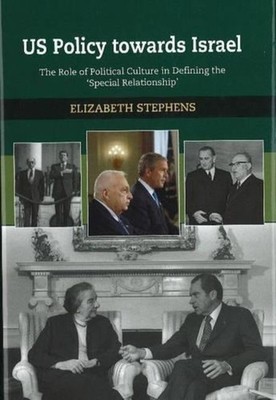
- We will send in 10–14 business days.
- Author: Elizabeth Stephens
- Publisher: Sussex Academic Press
- ISBN-10: 184519232X
- ISBN-13: 9781845192327
- Format: 15.2 x 22.9 x 1.9 cm, minkšti viršeliai
- Language: English
- SAVE -10% with code: EXTRA
Reviews
Description
The rationale for Washington's enduring commitment to Israel has long been a puzzle. During the Cold War it was argued that democratic Israel was a natural ally amidst a world of semi-authoritarian and often pro-Soviet states. But the Cold War is over and the American commitment to Israel, a small state that is largely oil-free and of little tangible economic benefit, remains. An alternative view is that the US commitment is underwritten by the Jewish lobby which exercises a disproportionate influence on American policy. Even when combined with the influence of Protestant fundamentalists who, for largely religious reasons, increasingly support Israel, it is still questionable whether interest group politics could determine American foreign policy to such an extent. Despite transitions between Republican and Democratic presidents, bureaucratic support for Israel remains relatively constant indicating that support for Israel is not a product of partisan politics but a given, firmly ingrained in political discourse. This book explains the American commitment to Israel within a framework of political culture. Although political culture is not the sole explanatory factor in the development of US policy toward Israel, it has played a key role in serving to shape and define the American approach to foreign affairs, thus contributing to decisions and operations that cannot easily be explained solely in geopolitical, economic, or military terms.
EXTRA 10 % discount with code: EXTRA
The promotion ends in 22d.08:13:45
The discount code is valid when purchasing from 10 €. Discounts do not stack.
- Author: Elizabeth Stephens
- Publisher: Sussex Academic Press
- ISBN-10: 184519232X
- ISBN-13: 9781845192327
- Format: 15.2 x 22.9 x 1.9 cm, minkšti viršeliai
- Language: English English
The rationale for Washington's enduring commitment to Israel has long been a puzzle. During the Cold War it was argued that democratic Israel was a natural ally amidst a world of semi-authoritarian and often pro-Soviet states. But the Cold War is over and the American commitment to Israel, a small state that is largely oil-free and of little tangible economic benefit, remains. An alternative view is that the US commitment is underwritten by the Jewish lobby which exercises a disproportionate influence on American policy. Even when combined with the influence of Protestant fundamentalists who, for largely religious reasons, increasingly support Israel, it is still questionable whether interest group politics could determine American foreign policy to such an extent. Despite transitions between Republican and Democratic presidents, bureaucratic support for Israel remains relatively constant indicating that support for Israel is not a product of partisan politics but a given, firmly ingrained in political discourse. This book explains the American commitment to Israel within a framework of political culture. Although political culture is not the sole explanatory factor in the development of US policy toward Israel, it has played a key role in serving to shape and define the American approach to foreign affairs, thus contributing to decisions and operations that cannot easily be explained solely in geopolitical, economic, or military terms.


Reviews